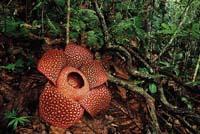A family for a giant plant

Taxonomists have taken an important step in the classification of plants: they have managed to classify a plant with giant flowers at the two hundred years of their discovery.
The plant had scientific name, Rafflesia arnoldii, and is not the only plant with giant flowers. However, biologists did not know in which family they should classify, that is, which other plants are the closest in evolution.
The methods used to find out have not served. On the one hand, they have not been able to perform the usual morphological study, since the plant has no stems or leaves. It does not have it because the plant is parasitic and is fed by microscopic fungi. On the other hand, the DNA study used for the classification of species has not given good results either. Normally the DNA of chloroplasts is used to classify plants, but being parasite has lost these genes.
Finally, biologists have had to use mitochondrial DNA to classify the plant. It has been a great job, since they have had to study the DNA of the mitochondria of many other plants to be able to compare species, and they have had to analyze more than one hundred species in total.





